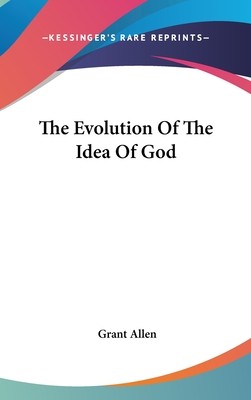
- We will send in 10–14 business days.
- Author: Grant Allen
- Publisher: Kessinger Publishing
- ISBN-10: 0548051682
- ISBN-13: 9780548051689
- Format: 15.2 x 22.9 x 3 cm, hardcover
- Language: English
- SAVE -10% with code: EXTRA
Reviews
Description
Originally published in 1897, The Evolution of the Idea of God is a study of humans' belief in God from primitive tribal religions to what Allen considered the more advanced Christian view. The main question explored here is "How did we arrive at our knowledge of God?" Rather than trying to prove or disprove any claims about the divine, Allen's method simply traces the psychological processes that led humans to religious belief, and further, from a belief in polytheism to monotheism. Students of religion, mythology, and human psychology will find this an intriguing work.
Excerpt from The Evolution of the Idea of God: An Inquiry Into the Origins of Religion
From the very beginning, however, a legend, true or false (but whose truth or falsity has no relation whatever to our present subject), gathered about the personality of this particular Galilean peasant reformer. Reverenced at first by a small body of disciples of his own race and caste, he grew gradually in their minds into a divine per sonage, Of whom strange stories were told, and a strange history believed by a group of ever-increasing adherents in all parts of the graeco-roman Mediterranean civilisa tion. The earliest of these stories, in all probability - cer tainly the one to which most importance was attached by the pioneers of the faith - clustered about his death and its immediate sequence. Jesus, we are told, was crucified, dead, and buried. But at the end of three days, if we may credit the early documents of our Christian faith, his body was no longer to be found in the sepulchre where it had been laid by friendly hands and the report spread abroad that he had risen again from the dead, and lived once more a somewhat phantasmal life among the living in his province. Supernatural messengers announced his resur rection to the women who had loved him he was seen in the flesh from time to time for very short periods by one or other among the faithful who still revered his memory. At last, after many such appearances, more or less fully described in the crude existing narratives, he was suddenly carried up to the sky before the eyes of his followers, where, as one of the versions authoritatively remarks, he was received into heaven, and sat on the right hand of God - that is to say, of Jahweh, the ethnical deity of the Hebrew people.
EXTRA 10 % discount with code: EXTRA
The promotion ends in 20d.09:51:30
The discount code is valid when purchasing from 10 €. Discounts do not stack.
- Author: Grant Allen
- Publisher: Kessinger Publishing
- ISBN-10: 0548051682
- ISBN-13: 9780548051689
- Format: 15.2 x 22.9 x 3 cm, hardcover
- Language: English English
Originally published in 1897, The Evolution of the Idea of God is a study of humans' belief in God from primitive tribal religions to what Allen considered the more advanced Christian view. The main question explored here is "How did we arrive at our knowledge of God?" Rather than trying to prove or disprove any claims about the divine, Allen's method simply traces the psychological processes that led humans to religious belief, and further, from a belief in polytheism to monotheism. Students of religion, mythology, and human psychology will find this an intriguing work.
Excerpt from The Evolution of the Idea of God: An Inquiry Into the Origins of Religion
From the very beginning, however, a legend, true or false (but whose truth or falsity has no relation whatever to our present subject), gathered about the personality of this particular Galilean peasant reformer. Reverenced at first by a small body of disciples of his own race and caste, he grew gradually in their minds into a divine per sonage, Of whom strange stories were told, and a strange history believed by a group of ever-increasing adherents in all parts of the graeco-roman Mediterranean civilisa tion. The earliest of these stories, in all probability - cer tainly the one to which most importance was attached by the pioneers of the faith - clustered about his death and its immediate sequence. Jesus, we are told, was crucified, dead, and buried. But at the end of three days, if we may credit the early documents of our Christian faith, his body was no longer to be found in the sepulchre where it had been laid by friendly hands and the report spread abroad that he had risen again from the dead, and lived once more a somewhat phantasmal life among the living in his province. Supernatural messengers announced his resur rection to the women who had loved him he was seen in the flesh from time to time for very short periods by one or other among the faithful who still revered his memory. At last, after many such appearances, more or less fully described in the crude existing narratives, he was suddenly carried up to the sky before the eyes of his followers, where, as one of the versions authoritatively remarks, he was received into heaven, and sat on the right hand of God - that is to say, of Jahweh, the ethnical deity of the Hebrew people.


Reviews